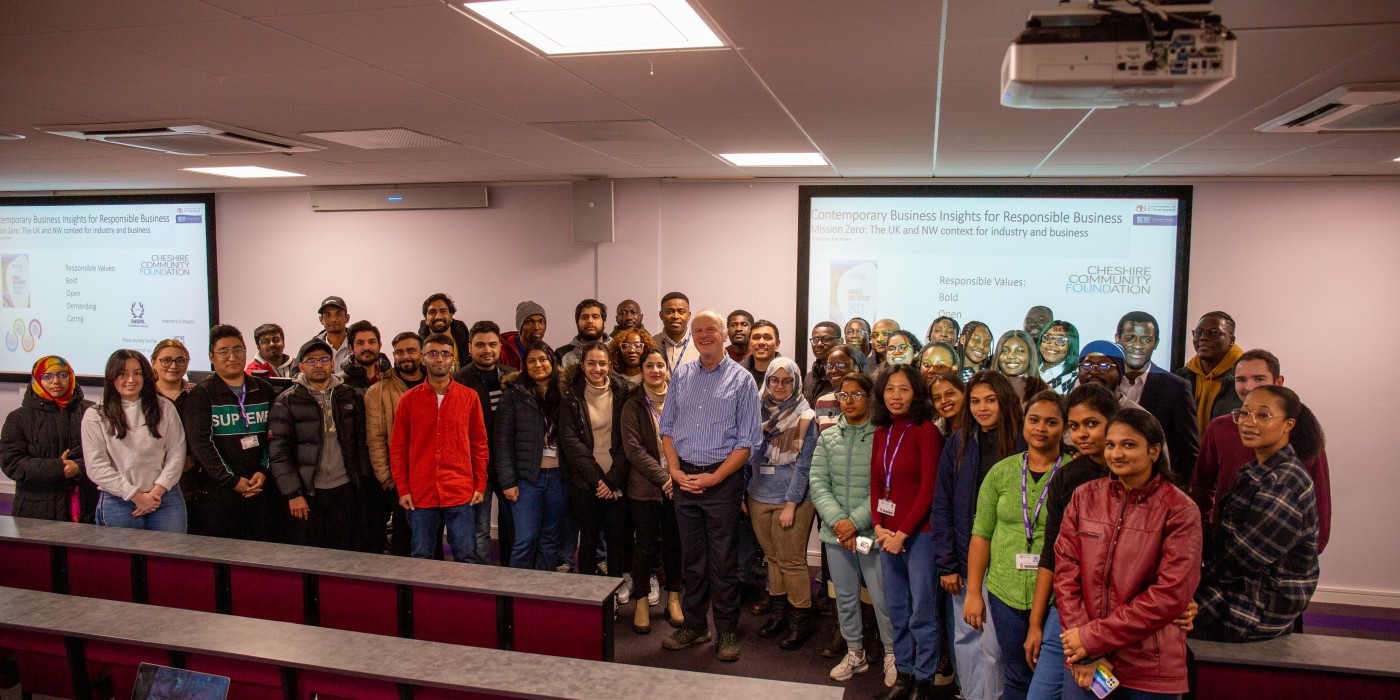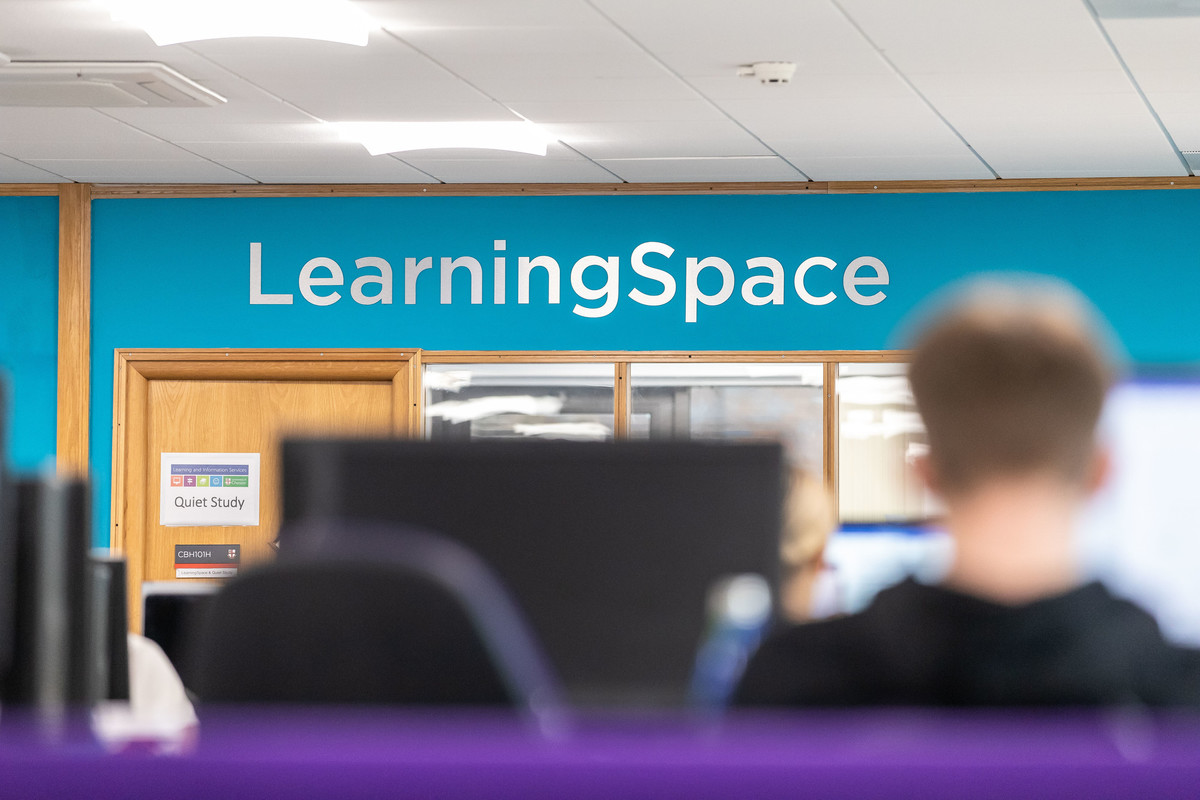Master of Business Administration MBA

You are viewing Course summary
Course Summary
The Chester MBA offers you the chance to build your global network, test your creativity, challenge your perceptions and develop responsible management skills for international corporate success.
Studying with us allows you to tailor your MBA to your career requirements with our wide range of modules, whilst creating a global professional network with peers from around the world with our diverse student group.
Our flagship MBA degree will provide you with a firm foundation in core business principles, while developing a broadened outlook and understanding of the role of business in the world, all informed by the Principles of Responsible Management Education (PRME) and Sustainable Development Goals. You will be challenged to explore the areas that interest you most and gain the strategic skills and insight to start a successful career.
Based in Chester, the famous walled city, our Business School is nestled on the banks of the stunning River Dee. The MBA is led by AMBA member Dr Trevor Omoruyi and includes a series of MBA Masterclasses from industry experts, bringing you cutting-edge business insights to inform your learning.
There is an option to choose a Project/Placement year for this course, at an additional cost.
Optional 2-year master's to suit your needs
Choosing a Professional Placement MSc is a win-win for your career, giving you the chance to get real experience, apply your cutting-edge skills in the workplace and stand out to future employers.
In the first year you will have help from the University to find a placement, whilst developing your expertise. You will then spend your second year out in industry on placement, getting the chance to work with industry professionals and grow your network of industry contacts. Bringing the latest business school insights to industry, you will get to make a difference to the workplace and make lasting links with your employer.
Students need to find and secure their own placement, supported by the University. A preparation module will also help you to get ready for your placement.
Please note, this programme is available as a one-year master degree programme, or as a Two-Year Master's Programme with a Professional Placement or Project. Please carefully consider your options when applying for our one year or Two-year routes as successful international applicants will not be able to change between programmes after a Confirmation of Acceptance of Studies (CAS) letter has been issued or after arriving in the UK.
What you’llStudy
Leadership in Action will embed the values of reflective action learning and cultivating a camaraderie culture distinctive to Chester. This is reinforced with subjects such as Leading and Managing Ethically, challenging you to think and act in management situations. The course ends with Preparing for Research Consultancy and Management Research in Action. These modules focus on making some form of impact through scenario/live projects, to deliver research projects for business-driven problems.
If you choose a placement or project year, the Research Dissertation module will be replaced by a placement or project module.
Module content:
- Critical appraisal of latest leadership/management effectiveness theory including psychological and social capital.
- Managing the self: audit of personal leadership capabilities, qualities and appraisal of future career trajectories.
- Diagnosis of leadership learning style preferences to develop students' own CPD improvement plan.
Module aims:
- To obtain an appreciation of latest effective leadership theory -What does it take to be an effective leader.
- Provide a framework for students Self-reflection of their own personal leadership identifying areas for future improvement - How well am I doing?
- Creation of a future learning/development plan for their future leadership development, CPD - Where do I need to focus?
Module content:
- The concept and scope of marketing; marketing activities and concept of customer value.
- Analysis of the marketing environment, the marketing capabilities, vision of organisations, and contemporary issues in marketing strategy in different industries and markets.
- Overview of marketing strategy, analysis, objectives, and implementation and control of marketing programmes.
- Target marketing: segmentation, targeting and positioning of products, services and organisations in the mind of customers.
- Critiquing marketing strategies and activities.
- Buyer behaviour.
- The importance and impact of branding.
- The use, implementation and evaluation of marketing communications.
- The role of Integrated Marketing Communications, evaluation and use of digital communications.
Module aims:
- To enable students to critically evaluate the analytical models and concepts that underpin market analysis and the marketing process and how they apply in business.
- To provide an understanding of the contextual factors which influence and determine marketing environments and to impart an understanding of the nature and variety of marketing issues arising in the context of the different market places.
- To enable students to explore issues and apply knowledge concerning practice of marketing in rapidly changing business contexts, through the use of case study evidence and seminar presentations and discussion.
- To provide a foundation of knowledge and understanding that will complement learning in other modules on the programme.
Module content:
- Financial accounting – Analysis of financial reporting. Understanding the format and content of financial statements and reports;
- Management accounting – Identify and assess developments in management accounting and performance management;
- Evaluation and measurement of organisational performance.
Module aims:
- To enable students to explore and develop an understanding of the theoretical techniques, concepts and methods employed in finance.
- To develop the ability to apply theoretical to the practical, through the analysis of data and application of relevant techniques in the context of a variety of organisations.
- To evaluate and develop a critical and reflective awareness of the importance of the application of finance to decision making within organisations
Module content:
- Introduction to Business Ethics
- Contemporary issues in Business Ethics
- Perspectives on the role of Business Ethics: Stakeholder and Stockholder Theory
- Corporate Social Responsibility (CSR)
- The Ethical Leader
- An ethical framework for HRM
- Ethical HRM – employee voice
- Ethical HRM – managing reward
- Ethical HRM – managing performance
- Ethical HR – flexibility, well-being and work-life balance
Module aims:
The aim of this module is to enable delegates to:
- Develop a critical understanding of the theories, concepts, and approaches towards business ethics
- Assess the implications of business ethics to key Human Resource Management practices
- Synthesise knowledge and experience of managing and leading people to develop appropriate responses to differing situations from an ethical perspective
- Develop and extend the capacity of individuals to ethically lead and manage
Module content:
- Understanding strategy: introducing strategy, characteristics of strategic decisions, levels of strategy, vocabulary of strategy, strategic management in different contexts.
- Analysing resources and capabilities: external and internal audit, managing strategic information, customer and competitor analysis, understanding industries and markets, sources of competitive advantage, strategic capability.
- Expectations and purposes: stakeholder expectations, business ethics and social responsibility, communicating organisational purposes values mission statements objectives.
- Strategic choice: directions and methods of development, strategic alliances, competitive strategies, managing risk.
- Strategy development and implementation: managing change, managing performance.
Module aims:
- Understand the vocabulary of strategy and develop an appreciation of the main areas of study in corporate strategy: including the need to appreciate issues of ethics and information management in formulating corporate strategy.
- Critically evaluate the practical issues and problems of corporate strategy as applied to an organisational context: including appreciation of the significance and sources of competitive advantage.
- Explore both the rational and creative approaches to the development of successful corporate strategy in an organisational context.
- Appreciate and develop an understanding of the way in which organisational structures, processes, information systems and the management of relationships, are important in organising for strategic success.
Module content:
- Introduction to research philosophy and principles
- Qualitative and quantitative research strategies
- Using and analysing secondary data for consultancy
- Impact and critical reflection
- Choosing and framing a research question
- Searching for literature and writing a critical literature review
- Devising a research methodology
- Project planning and management
- Research ethics
- Preparing a defensible research proposal
Module aims:
- To provide students with the opportunity to devise a personal programme of academic research
- To provide students with the necessary skills to undertake a personal programme of academic research
- To enhance students' project planning, presentation, critical reflection and study skills
Module content:
- Introduction to Management Research in Action
- Critically reviewing literature for a management research project
- Evaluating appropriate data collection methods
- Data analysis techniques for various research strategies
- Resource and risk planning in research
- Undertaking management research based on one of four approaches; i) consultancy ii) empirical research iii) library/secondary research iv) opportunity recognition/entrepreneurship (writing a masters management research project report based either on pre-existing secondary data or from the data collected from the above choices)
- Critical personal reflection of the research journey and discussion of implications for organisations
Module aims:
- Provide students with the skills to develop the work from an existing research proposal into a piece of rigorous management research or an organisation-specific project using secondary or primary data; as negotiated with their supervisor
- To provide students with the skills to write up an extended piece of research, demonstrating academic rigour, including consideration of methodological and ethical issues associated with the programme of academic research or the organisation specific project
- To enhance students' project planning, presentation, critical reflection and analysis skills
Module content:
- Understanding "wicked" problems
- Introduction to hard, soft, and creative tools, techniques and methods
- Developing creative thinking skills for managers
- Application of creative management thinking to provide innovative solutions to organisational problems
- Evaluating the innovative solution to a soft management problem
Module aims:
- Differentiate between organisational systems and "wicked" problems that are resolvable via hard, soft and creative management approaches
- Enable students to apply soft and/or creative thinking to a "wicked" management problem
- Enable students to critically evaluate the application of a soft and/or creative approach to a "wicked" management problem

Sevda's Student Story
All of the students on the MBA course have different objectives, focuses and learning styles. We offer you a range of subject options so you can adapt your MBA to meet your career goals. Assessments can be presentations or written assignments – sometimes both – and a management project (dissertation).
Entry Requirements
2:2 honours degree
Applicants will normally be expected to hold a first degree with a minimum of 2:2 honours or equivalent. In addition, it is anticipated that students will be able to demonstrate some form of previous work experience. Where they do not, the University will assess the student’s application carefully for equivalence and, where necessary, the student will be required to engage with appropriate employment-related experience early during their study programme to ensure that relevant skills are embedded in their learning journey.
Applicants whose first language is not English must provide evidence of English language proficiency qualification.
2:2 honours degree
Applicants will normally be expected to hold a first degree with a minimum of 2:2 honours or equivalent. In addition, it is anticipated that students will be able to demonstrate some form of previous work experience. Where they do not, the University will assess the student’s application carefully for equivalence and, where necessary, the student will be required to engage with appropriate employment-related experience early during their study programme to ensure that relevant skills are embedded in their learning journey.
Please note, some programmes have special entry requirements.
English Language Requirements
For more information on our English Language requirements, please visit International Entry Requirements.
Fees and Funding
£14,040 for the full course (2025/26)
Guides to the fees for students who wish to commence postgraduate courses are available to view on our Postgraduate Taught Programmes Fees page.
£15,200 for the full course (2025/26)
The tuition fees for international students studying an MBA in 2025/26 are £15,200.
Please note: For MSc programmes where a placement or project year is undertaken there will be an additional charge of £2,750 for the placement/project year (due at the start of the second year of the course).
The University of Chester offers generous international and merit-based scholarships for postgraduate study, providing a significant reduction to the published headline tuition fee. You will automatically be considered for these scholarships when your application is reviewed, and any award given will be stated on your offer letter.
For more information, go to our International Fees, Scholarship and Finance section.
Irish Nationals living in the UK or ROI are treated as Home students for Tuition Fee Purposes.
Your course will involve additional costs not covered by your tuition fees. This may include books, printing, photocopying, educational stationery and related materials, specialist clothing, travel to placements, optional field trips and software. Compulsory field trips are covered by your tuition fees.
If you are living away from home during your time at university, you will need to cover costs such as accommodation, food, travel and bills.
The University of Chester supports fair access for students who may need additional support through a range of bursaries and scholarships.
Full details, as well as terms and conditions for all bursaries and scholarships can be found on the Fees & Finance section of our website.
Your future Career
Careers service
The University has an award-winning Careers and Employability service which provides a variety of employability-enhancing experiences; through the curriculum, through employer contact, tailored group sessions, individual information, advice and guidance.
Careers and Employability aims to deliver a service which is inclusive, impartial, welcoming, informed and tailored to your personal goals and aspirations, to enable you to develop as an individual and contribute to the business and community in which you will live and work.
We are here to help you plan your future, make the most of your time at University and to enhance your employability. We provide access to part-time jobs, extra-curricular employability-enhancing workshops and offer practical one-to-one help with career planning, including help with CVs, applications and mock interviews. We also deliver group sessions on career planning within each course and we have a wide range of extensive information covering graduate jobs .
 ">
">
 ">
">











